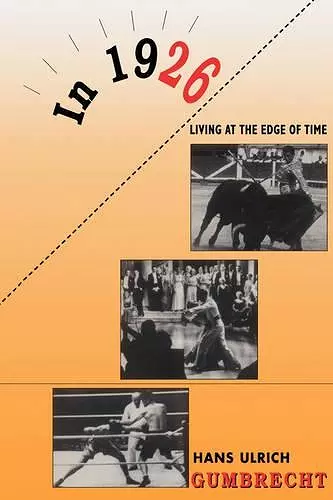In 1926
Living on the Edge of Time
Format:Paperback
Publisher:Harvard University Press
Published:17th Mar '98
Should be back in stock very soon

Travel back to the year 1926 and into the rush of experiences that made people feel they were living on the edge of time. Touch a world where speed seemed the very essence of life. It is a year for which we have no expectations. It was not 1066 or 1588 or 1945, yet it was the year A. A. Milne published Winnie-the-Pooh and Alfred Hitchcock released his first successful film, The Lodger. A set of modern masters was at work--Jorge Luis Borges, Babe Ruth, Leni Riefenstahl, Ernest Hemingway, Josephine Baker, Greta Garbo, Franz Kafka, Gertrude Stein, Martin Heidegger--while factory workers, secretaries, engineers, architects, and Argentine cattle-ranchers were performing their daily tasks.
Hans Ulrich Gumbrecht opens up the space-time continuum by exploring the realities of the day such as bars, boxing, movie palaces, elevators, automobiles, airplanes, hair gel, bullfighting, film stardom, dance crazes, and the surprise reappearance of King Tut after a three-thousand-year absence. From the vantage points of Berlin, Buenos Aires, and New York, Gumbrecht ranges widely through the worlds of Spain, Italy, France, and Latin America. The reader is allowed multiple itineraries, following various routes from one topic to another and ultimately becoming immersed in the activities, entertainments, and thought patterns of the citizens of 1926.
We learn what it is to be an "ugly American" in Paris by experiencing the first mass influx of American tourists into Europe. We visit assembly lines which turned men into machines. We relive a celebrated boxing match and see how Jack Dempsey was beaten yet walked away with the hearts of the fans. We hear the voice of Adolf Hitler condemning tight pants on young men. Gumbrecht conveys these fragments of history as a living network of new sensibilities, evoking in us the excitement of another era.
[Gumbrecht] approaches the culture of the early twentieth century in an...ingenious and intriguing way in his In 1926. What interests him, he says, is to what extent a year, a simple, purely conventional unit of time, can be constituted as an object of historical inquiry--not, however, with the purpose of isolating that year's essence or significance, but rather simply by way of getting some inkling of what it was like to be alive at the time. -- Edwin Frank * Boston Review *
Written almost entirely in the present tense, and zooming cinematically from a lone woman swimming the English Channel to roof gardens in Manhattan, the book attempts to re-create the feeling of 'being-in-1926,' to borrow the author's Heideggerian formulation. The entries are a droll pastiche of literary criticism, sociological statistics, and historical anecdotes. -- Adam Shatz * Lingua Franca *
Acting as the literary equivalent of Web surfing, the innovative structure [of this book] perfectly reflects the increasingly kinetic and fragmented culture of the time, when the inherited certainties of faith and tradition were giving way to volatile and mass enthusiasms in sports and cinema and to unsettling experiments in technology, music, and gender roles. In both content and form, this work is an important advance in cultural scholarship. -- Bryce Christensen * Choice *
In the year 1926, no presidents were elected or assassinated, no wars began or ended, and no titans strode across the world stage. But beneath the year's deceptive quiet, a turbulent new world was aborning, its gestation signaled by the tortured fiction of Kafka, the ontological ponderings of Heidegger, the labyrinthine wanderings of Borges, the comedic paths of Chaplin, the daring theorizing of Freud, and he fevered rhetoric of Hitler. Gumbrecht invites us to experience this year in a book that discards the conventions of linear narrative in favor of a series of 51 essays interconnected by numerous cross-references. Acting as the literary equivalent of Web surfing, the innovative structure perfectly reflects the increasingly kinetic and fragmented culture of the time, when the inherited certainties of faith and tradition were giving way to volatile mass enthusiasms in sports and cinema and to unsettling experiments in technology, music, and gender roles. In both content and form, this work is an important advance in cultural scholarship. -- Bryce Christensen * Booklist *
ISBN: 9780674000551
Dimensions: unknown
Weight: 662g
448 pages